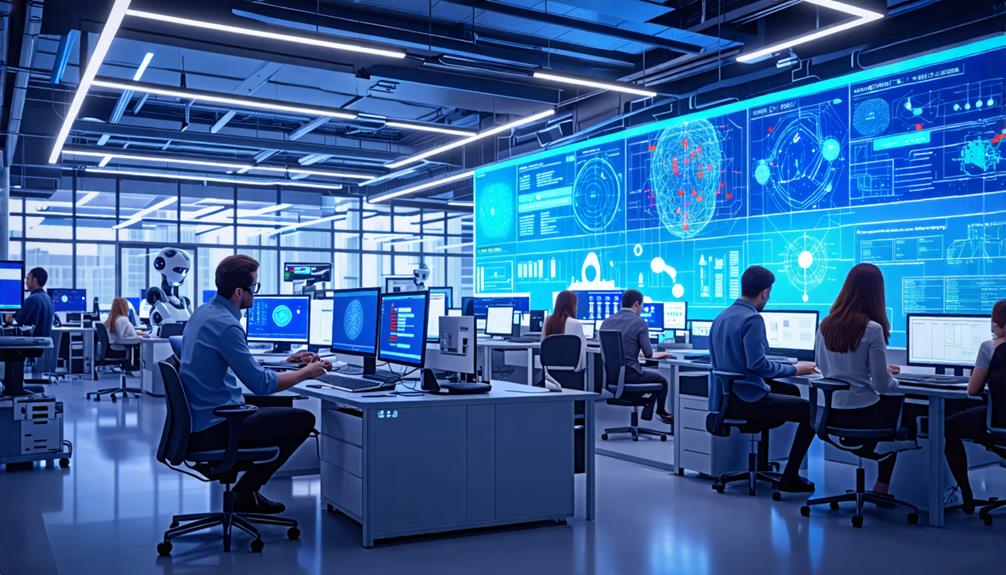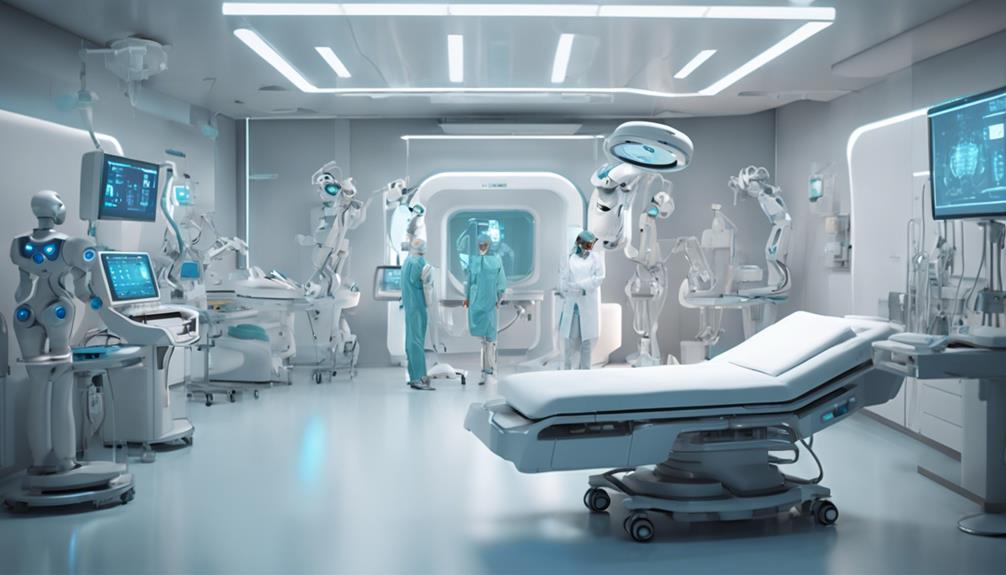
As AI rolls out across different sectors, you'll see healthcare, financial services, and cybersecurity experiencing significant growth. In healthcare, AI's ability to improve diagnoses and surgical precision really changes the game. You'll find financial services becoming more accessible and efficient, thanks to AI-powered advisories and automated transactions. Meanwhile, cybersecurity will be revolutionized with AI-driven threat detection and response systems. These advancements suggest that each sector is poised for a technological transformation, opening up myriad possibilities that could deepen your understanding and perhaps even your involvement in these exciting future landscapes.
Healthcare Transformation With AI

AI's integration into healthcare has revolutionized how you receive medical treatment and diagnosis. Now, when you visit the doctor, AI tools analyze your data to predict and prevent diseases before they manifest. It's not just about identifying what's wrong; it's about foreseeing what could go wrong, giving you a proactive advantage in your health management.
Imagine undergoing scans that AI systems evaluate in real-time, spotting anomalies faster than the human eye. These tools aren't just fast; they're incredibly accurate. They reduce the chances of human error, ensuring that your diagnosis is precise, which directly influences the effectiveness of your treatment. You're not just another patient in the system; you're a unique individual with health insights tailored specifically to you.
Moreover, AI applications extend to surgical procedures where robotic assistants, guided by AI, support surgeons to perform complex operations with enhanced precision and control. This technology isn't just supporting medical staff—it's transforming them into superhuman healers armed with data and tools that were unimaginable just a decade ago.
This shift isn't merely technological; it's deeply personal. With AI, your health journey is more secure, streamlined, and, most importantly, centered around you.
AI's Impact on Financial Services
Financial services have undergone a significant transformation due to AI, enhancing how you manage and interact with your money. With AI-driven tools, you're now able to get personalized financial advice without the hefty fees usually associated with wealth managers. Algorithms analyze your spending habits, investment history, and financial goals to give tailored advice that fits your needs perfectly.
AI doesn't just stop at personal finance; it's also revolutionizing the broader financial landscape. Stock trading bots now execute trades at speeds and accuracies far beyond human capabilities, potentially increasing your returns on investment. These bots monitor market conditions in real-time, react instantly to market shifts, and can manage multiple transactions simultaneously, ensuring you're always ahead of the game.
Moreover, AI has streamlined the lending process, making it quicker and more accessible for you. By automating credit scoring using vast amounts of data, lenders can assess risk more accurately and offer you competitive rates faster than ever before. This efficiency not only saves you time but also opens up opportunities for those who might've been overlooked by traditional banking methods.
In essence, AI is equipping you with tools that were once available only to the elite in finance, democratizing financial services and empowering you to make better-informed decisions.
Cybersecurity Enhancement Through AI

As you navigate the digital world, AI significantly enhances cybersecurity by detecting and responding to threats more rapidly than ever before. This technology isn't just about speed; it's about smart, proactive defense mechanisms that stay one step ahead of potential cyber risks.
Imagine you're managing a network. AI can continuously learn and adapt, identifying patterns that may suggest a breach long before a human could. This isn't just theory—it's happening now. Companies are integrating AI systems that can predict and thwart attacks by learning from the vast amount of data they gather. They're becoming indispensable in safeguarding sensitive information.
Moreover, AI-driven tools are essential in managing the sheer volume of security data. They filter out false alarms, which saves you time and lets you focus on genuine threats. Think about phishing attempts that are becoming ever more sophisticated; AI helps by analyzing the authenticity of communications at an unprecedented scale and precision.
The impact? You're not just reacting to threats; you're preemptively tackling them, reducing downtime and protecting your assets more effectively.
As cyber threats evolve, AI in cybersecurity isn't just helpful; it's critical. It's not about replacing human expertise but augmenting it, ensuring you and your data stay safer.
Data Analytics and AI Integration
Integrating AI with data analytics transforms how you uncover insights from complex datasets. By using machine learning algorithms, you're now able to process and analyze data at speeds and accuracies that were unimaginable before. This integration means that you can quickly identify trends, predict market changes, and make data-driven decisions effectively.
You're witnessing a shift where traditional data analysis methods become enhanced by AI's capability to learn from data without explicit programming. This not only speeds up your analysis processes but also improves the precision of your findings. For instance, predictive analytics powered by AI can help you foresee customer behaviors, operational hitches, or financial fluctuations with a remarkable degree of accuracy.
Moreover, AI's ability to handle large volumes of data from various sources simultaneously allows you to get a holistic view of your operational landscape. This is crucial when you're dealing with big data environments, where the sheer volume and variety of data can be overwhelming.
As you continue to leverage AI in your data analytics, you'll find that it's not just about handling data more efficiently. It's about making smarter, more informed decisions that can drive your business forward in an increasingly competitive landscape.
AI Advancements in Retail

How is AI revolutionizing the retail industry?
Imagine walking into a store where your shopping experience is tailored just for you. AI is making this a reality by transforming how retailers understand and interact with you. Through personalized recommendations and virtual fitting rooms, you're finding what you want quicker than ever before.
AI-driven analytics help stores optimize their inventory, ensuring they've got what you need, when you need it. No more wasted trips or out-of-stock disappointments.
Plus, AI in retail isn't just about selling more efficiently—it's also enhancing your user experience. Chatbots that understand your queries, digital mirrors that suggest outfits, and smart shelves that alert staff when products run low, all contribute to a seamless shopping journey.
You're also seeing prices adjusted in real-time based on demand, thanks to AI algorithms. This dynamic pricing strategy means you might snag a deal more often, making your wallet happier.
And behind the scenes, AI streamlines operations from supply chain logistics to checkout processes, reducing costs and passing those savings onto you.
Automotive Innovations via AI
Just like in retail, AI is reshaping the automotive industry by enhancing both the production processes and the driving experience. You're now seeing cars that not only learn your driving habits but also adapt to them, improving safety and efficiency.
AI-driven analytics are streamlining production lines, reducing waste, and speeding up assembly times, which means you can get your new car faster than ever before.
Imagine your vehicle detecting a potential problem and scheduling its own maintenance or updating its software overnight to bring you new features without a visit to the dealer. That's the power of AI in action.
Autonomous driving technologies are evolving rapidly, thanks to AI. You might soon find yourself in a car that can completely take over the driving, letting you relax or work during your commute.
AI is also making cars more eco-friendly. By optimizing engine performance and fuel usage, AI helps reduce your carbon footprint. Plus, with AI's help in developing better battery technologies, electric vehicles are becoming more viable for everyone, not just the environmentally conscious.
This is transforming how you think about travel, making it cleaner and more efficient. As AI continues to advance, expect to see these innovations become the new normal in automotive technology.
Frequently Asked Questions
How Will AI Affect Small Business Competitiveness?
AI will boost your small business's competitiveness by streamlining operations, reducing costs, and enhancing customer experiences. You'll be able to compete with larger companies by leveraging technology that automates and optimizes tasks.
What Are the Ethical Implications of AI in Hiring?
You'll find AI in hiring raises serious ethical issues. It can lead to biases being automated and privacy invaded if not carefully managed. Ensuring transparency and fairness is crucial in its implementation.
Will AI Significantly Decrease Job Opportunities?
AI might reduce some jobs, but you'll find it also creates new opportunities, particularly in tech and AI maintenance. It's a shift rather than a reduction, reshaping how and where you might work.
How Can AI Contribute to Sustainability in Industries?
AI can optimize resource use and reduce waste across industries, enhancing sustainability. You'll see improved energy efficiency and smarter supply chain management, significantly lowering environmental impacts and promoting greener practices.
What Legal Protections Are Needed Against AI Misuse?
You'll need robust privacy laws, strict data security measures, and clear accountability guidelines to protect against AI misuse. These legal frameworks should evolve as AI technology and its applications continue to develop.
Conclusion
As you've seen, AI's impact is reshaping numerous sectors. In healthcare, it's revolutionizing treatments and diagnostics.
In finance, AI streamlines operations and enhances decision-making.
Cybersecurity is becoming more robust, thanks to AI's predictive capabilities.
Data analytics are now more insightful with AI integration, aiding sectors like retail in personalizing customer experiences.
Lastly, the automotive industry is innovating rapidly with AI, leading to smarter, safer vehicles.
You're witnessing a transformative era across these industries, driven by AI advancements.






